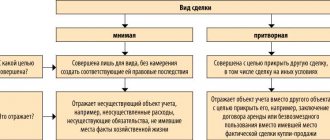The dismissal of the general director by agreement of the parties has its own characteristics. We will tell you further what documents need to be drawn up and whether compensation needs to be paid for such dismissal.
General provisions on the dismissal of a manager by agreement of the parties
Negotiations about dismissal
The decision-making procedure for the owners of the organization
Signing an agreement to terminate an employment contract (sample)
Do I need to pay compensation to the director for dismissal by agreement?
Issuance of a dismissal order
Filling out a work book
Performance of duties by the employer on the day of dismissal
General provisions on the dismissal of a manager by agreement of the parties
Dismissal by agreement of the parties is a fairly common and beneficial basis for both the employee and the employer.
The general director (director, president, chief - the title of the position of the executive body performing its functions individually is determined in the organization's charter), with whom an employment contract is concluded, is the same employee as others. His dismissal on the basis of an agreement is carried out in the usual manner, but with some peculiarities.
You can find more complete information on the topic in ConsultantPlus. Full and free access to the system for 2 days.
Here is a general algorithm of actions for dismissing a manager in connection with an agreement between the parties:
- Written documentation of the initiative of one of the parties to conclude an agreement.
- Registration of the founders’ decision to terminate the employment contract.
- Conclusion of an agreement.
- Issuance of a dismissal order.
- Filling out a work book.
- Payment of due amounts of money.
Let's look at each of the stages in more detail.
Reasons for dismissal
Dismissal by agreement of the parties, unlike all other options, can be made at any time. To do this, it is enough to reach appropriate agreements between the employer and the employee.
In most cases, the reason for dismissal is:
- Transfer of the general director to any other position.
- Termination of the agreement at the initiative of one of the parties.
- Expiration of the employment contract.
- Change of owner of an enterprise or company.
- The general director makes gross mistakes and makes unreasonable decisions.
Negotiations about dismissal
The initiative to dismiss a hired manager by agreement of the parties can come from both himself and the founder (founders) of the organization. In order to avoid possible legal proceedings with the dismissed person, it is recommended to formalize negotiations on this issue in writing, although there is no such requirement in the law.
NOTE! Contrary to a common misconception, any employee does not have to write a special statement to be dismissed by agreement of the parties, unlike dismissal at the request of the employee.
This may be in the form of a notification letter. It suggests considering the issue of dismissal. Such a letter states:
- grounds for dismissal (with reference to the legal norm - clause 1, part 1, article 77 of the Labor Code of the Russian Federation);
- day of dismissal;
- deadline for responding to notification.
An explanation of the reasons for the proposed dismissal option is not required. The letter is signed by the initiator personally. Likewise, the other party should outline its response to the notice.
Dismissal of the director due to the expiration of the employment contract
According to Art. 275 of the Labor Code of the Russian Federation if, in accordance with Part 2 of Art. 59 of the Labor Code of the Russian Federation, a fixed-term employment contract is concluded with the head of the organization; the validity period of this employment contract is determined by the constituent documents of the organization or by agreement of the parties. The consequences of the expiration of a fixed-term employment contract are provided for in Part 4 of Art. 58 and part 1 of Art.
According to the established rules, the employee must be warned in writing about the termination of an employment contract due to its expiration at least three calendar days before dismissal, except in cases where a fixed-term employment contract concluded for the duration of the duties of the absent employee expires. .
Since the general director is the head of the company, his responsibilities include, among other things, written notification of the termination of the employment contract with the employee due to its expiration. At the same time, legislation and judicial practice proceed from the fact that if a fixed-term employment contract is not terminated on time, the employee is not notified in advance about its expiration, then the fixed-term employment contract is transformed into an open-ended one in accordance with the provisions of Art. 58 Labor Code of the Russian Federation.
This means that it will no longer be possible to dismiss an employee due to the expiration of the employment contract, and the issuance of a dismissal order will be unlawful. To prevent this from happening, the employee must be warned in time that the employment contract with him will not continue. In order to avoid conflict situations with the general director, whose powers have come to an end, the owners can send notice of the expiration of his employment contract.
Thus, the procedure formally looks approximately the same as for voluntary dismissal; the difference will only be in the wording and article of the Labor Code of the Russian Federation.
The decision-making procedure for the owners of the organization
A decision such as the appointment of a general director in commercial organizations falls within the competence of the general meeting of participants or the sole founder. Similarly, it is necessary to record the fact that the owners (participants) of the company made a decision to dismiss the director by agreement of the parties.
If there are several participants in the company, then such a decision is formalized in a protocol. Otherwise, the decision of the sole founder (participant) is formalized. In this document, it is extremely important to reflect who is assigned to sign the agreement to terminate the employment contract on the part of the company (if there is only one participant, then he is the signatory, but this is also reflected in the decision).
The general director resigns of his own free will, but the employer is against his dismissal
A situation in which the CEO resigns voluntarily, but the business owners do not accept his “resignation,” seems to be a more difficult task. In this case, the director is still subject to all labor legislation, but in order to go through this procedure with the least losses, you will have to take the following steps:
- the general director will need to send a notice of his desire to terminate the employment contract at the legal address of the company and/or at the place of registration of the business owners;
- At the same time, the general director will need to initiate a general meeting and, if the business owners do not take any action within a reasonable time, then independently relinquish his powers and transfer affairs. If it is impossible to transfer the affairs to a successor, and this could be one of the founders, if a new general director has not been appointed, you can transfer the documents to a notary. Another option is to keep the documents and transfer them to the founders upon request;
- further, having a copy of the resignation letter and documents confirming the sending and/or receipt of the original resignation letter, the general director can make an entry in the Unified State Register of Legal Entities independently out of court. To do this, it is also necessary to have the application in form P14001 certified by a notary and sent to the tax authority.
It must be borne in mind that in this case a legal incident may arise - on the one hand, the company must have a general director indicated in the Unified State Register of Legal Entities, but the tax authorities have no reason not to remove the entry about the resigned director from the register (more about the approaches of the tax authorities and courts to resolve this issue, read the material “The director decided to resign, but society is against it: is it possible to cancel the entry about the director in the Unified State Register of Legal Entities?”, “EZh”, 2020, No. 33).
In the author’s practice, there was experience when the owner of the company was an offshore organization and in the process of dividing assets between the former owners, control and access to information and communication with the offshore legal entity were lost. As a result, the general director independently relinquished his powers:
- made an entry in the Unified State Register of Legal Entities;
- informed the banks about his dismissal;
- canceled all signatures;
- handed over the documents to the notary.
Signing an agreement to terminate an employment contract (sample)
The Labor Code of the Russian Federation does not provide for specific requirements for the form of an agreement on termination of an employment contract. But it is obvious that this must be a written, bilateral document. It is necessary to draw up the agreement in at least 2 copies (one for each party).
The text of the agreement consists of a preamble and conditions, among which you can specify any (if they do not contradict current legislation). You must indicate:
Subscribe to our newsletter
Read us on Yandex.Zen Read us on Telegram
- date of document preparation;
- information about the employer and employee;
- details of the employment contract;
- grounds for dismissal;
- the last day of work (day of dismissal), which is also the date of termination of the employment contract.
Among other things, the agreement may include conditions on the director’s obligation to return entrusted property, transfer affairs, etc.
The agreement is signed by the parties themselves. As mentioned above, on the employer’s side, the signatory is the only participant in the organization or a person authorized at the general meeting.
A sample agreement can be found on our website.
IMPORTANT! Neither party has the right to unilaterally change the terms of the signed agreement (unlike, for example, dismissal at the request of an employee, when the latter is authorized to withdraw his application at any time before the last day of work). This was indicated by the plenum of the Supreme Court of the Russian Federation in paragraph 20 of resolution No. 2 of March 17, 2004.
Compensation and payments
When terminating the employment relationship, if the interested parties have reached an agreement, the director is entitled to the following compensation:
- Earnings accrued for the last month worked (subject to personal income tax and insurance contributions).
- Cash compensation for days of unused vacation (subject to personal income tax and insurance contributions).
- Severance pay, if provided for by the terms of the signed agreement (Article 178 of the Labor Code) or in the labor/collective agreement (subject to personal income tax if the amount exceeds 3 average salaries). There are no insurance premiums.
- Other payments, if any are provided for in this organization (if they are registered at a specific enterprise)
Severance pay is not included in the list of mandatory payments. The presence or absence of this payment must be stated directly in the dismissal agreement or in an additional agreement. In this case, it does not matter and does not affect payments the fact which party directly initiated the termination of the relationship.
Attention
It is important to note that in the case of state-owned enterprises, the manager with whom the employment relationship is terminated (Article 78 of the Labor Code) does not have the right to count on other additional payments (severance pay, etc.) other than those provided for under the employment contract. It is prohibited to prescribe the payment of severance pay and (or) other additional compensation to the director in the agreement in accordance with Article 349.3 of the Labor Code of the Russian Federation.
Do I need to pay compensation to the director for dismissal by agreement?
The Labor Code of the Russian Federation contains only one case of mandatory payment of monetary compensation to the manager upon dismissal: if the decision to terminate his employment contract was made by the owner of the company (Article 279 of the Labor Code of the Russian Federation). In this case, the manager has the right to claim at least 3 times the average salary (per month).
According to Part 4 of Art. 178 of the Labor Code of the Russian Federation, a labor or collective agreement may provide for cases of payment of severance pay to employees upon dismissal, in addition to those specified in the code. At the same time, the above norm does not contain restrictions on the categories of employees and the grounds for their dismissal.
From the above, one could conclude: cases of payment of money to a manager upon dismissal for any reason (even by agreement of the parties) can be stipulated in the employment contract, and the corresponding conditions can be included in the text of the agreement. This practice was quite common until recently. Moreover, conditions for the payment of monetary compensation were included in the agreement on termination of relations with the director, even if the employment (or collective) agreement did not provide for its payment. Unless such expenses were taken into account for the purposes of establishing the base for income tax.
However, in 2014, the Labor Code of the Russian Federation was supplemented by Art. 349.3. It directly prohibits the inclusion of any compensation provisions in the agreement to terminate the employment contract with the manager. Moreover, we are talking not only about money, but also about the transfer of some property (for example, a block of shares). Conditions previously included in labor and collective agreements that contradicted this norm are no longer valid (Article 2 of the Law “On Amendments to the Labor Code of the Russian Federation...” dated April 2, 2014 No. 56-FZ).
Dismissal of the CEO by decision of the company's owners
According to Art. 279 of the Labor Code of the Russian Federation in case of termination of the employment contract with the head of the organization in accordance with clause 2 of Art. 278 of the Labor Code of the Russian Federation (in connection with the adoption by an authorized body of a legal entity, or the owner of the organization’s property, or a person (body) authorized by the owner of a decision to terminate an employment contract with a manager), in the absence of guilty actions (inaction) of the manager, he is paid compensation in the amount determined by the employment contract , but not less than three times the average monthly earnings.
As follows from paragraph 9 of the resolution of the Plenum of the Armed Forces of the Russian Federation dated 06/02/2020 No. 21 “On some issues that arose in the courts when applying the legislation regulating the work of the head of the organization and members of the collegial executive body of the organization,” even in the absence of violations on the part of the director, owners may decide to change it at an extraordinary or regular meeting.
Dismissal will take place according to the same scheme as when terminating an employment contract at the director’s own request. The only thing to remember: such a decision of the founders in any case can be challenged in court for various reasons. For example, if the decision to dismiss was made in violation of the principles of non-abuse of rights and (or) prohibition of discrimination in the world of work.
Dismissal by decision of the owners without payment of compensation is possible if the guilt of the general director is proven, for example, facts of theft are revealed, or a criminal case is opened. We emphasize that the guilt of the general director must be proven and documented. For example, if there is a shortage during an inventory, the involvement of the general director in theft must be proven, a criminal case must be opened; if his guilt is not proven during the investigation, then it will be impossible to dismiss him under this article without compensation.
Company expenses or lost profits are an even more difficult subject from the point of view of proving guilt. The director operates in market conditions and deals with certain commercial risks. Therefore, even with the involvement of expertise, it will be very difficult to prove guilt and, most importantly, intent to cause harm to the company.
More on the topic: Alimony for wife, disabled husband of group 2, 3 in case of divorce
It must be borne in mind that it is impossible to rely on assumptions and judgments as a reason for dismissal. Even the commission that identified the deficiency cannot be the body that makes a decision on the guilt of the employee.
Issuance of a dismissal order
In advance, before the day of dismissal of the manager, an administrative document should be drawn up (order or instruction - part 1 of article 84.1 of the Labor Code of the Russian Federation). After all, the director signs it independently (unless, of course, the corresponding powers are delegated to another person, for example, the head of the personnel service by proxy), as well as gets acquainted with it while still in the corresponding position.
Dismissal is usually formalized by order according to Form No. T-8 approved by the State Statistics Committee (Resolution “On approval of unified forms...” dated January 5, 2004 No. 1). However, it is not mandatory for use by employers, so it is possible to draw up such an order differently. It is only important to reflect in it all the essential points:
- information about the dismissed employee;
- grounds for dismissal with reference to the relevant paragraph, part and article of the Labor Code of the Russian Federation (details of the agreement on termination of the employment contract are also indicated);
- date of termination of the employment relationship.
Like any other employee, a resigning director has the right, in accordance with Part 2 of Art. 84.1 of the Labor Code of the Russian Federation, receive a duly certified copy of the administrative document on dismissal.
Stages of dismissal
Before dismissing the CEO, all stages of this procedure must be followed. Only in this case will the entire process be recognized as legal and will not have negative consequences for one of the parties.
Negotiations about dismissal
The first stage on the path to termination of cooperation is negotiations between the head of the organization and its founders.
Each party can initiate the entire process. At this stage, it is important to document all results in writing in order to avoid litigation in court in the future.
In the legislation of the Russian Federation there is no mention of the negotiation process; the rules for its conduct are chosen by the director, as well as the founder.
The entire procedure can be completed in the form of a notification letter, which specifies all the stages and requirements. In this case, it is possible not to indicate the reasons that prompted one of the parties to begin negotiations on terminating the employment contract. A correctly executed paper is signed by the initiator and handed over to the other party. The second participant in the process must send written notice of the decision made.
Decision making procedure
The general director is appointed to his position by the founder. It can be one person or several. In the second case, the issue must be discussed at a general meeting of the founders of the company or firm.
The situation is exactly the same with the dismissal of a manager. All owners need to make a collective decision on the issue of removing the general director by agreement of the parties, and also formally record it.
For this purpose, a decision protocol is drawn up. It must indicate the person who is entrusted to sign the agreement on termination of cooperation on the part of the founders of the company.
Signing the agreement
The Labor Code of the Russian Federation does not establish requirements for the execution and signing of a document.
As a rule, in this case, an official two-sided paper is drawn up. It is done in writing and in at least two copies. One of them is transferred to the trustee on the part of the company (or the sole founder), and the second - to the director. The text of the document takes into account a sample of the dismissal of a director by agreement of the parties, which should indicate the following:
- The exact date of preparation and execution of the document.
- Brief information about the parties to the agreement.
- Details of the employment contract.
- List of justified grounds for dismissal.
- Last day of tenure (is the date of termination of the contract).
- Conditions for the transfer of affairs to the new general director.
The authorized person and the former general director are required to personally sign all copies of the document.
Executive compensation
The Labor Code provides only one option, in which the manager is dismissed by agreement of the parties with payment of compensation. This is a case in which the owners of a company decide to terminate an employment contract. In this case, the dismissed employee has the right to receive at least three average monthly salaries.
In other situations, payments are made only if there are corresponding entries in the employment contract or the text of the agreement.
However, this does not take into account all expenses, and the resulting profit cannot be taxed. To combat this situation, a law was developed that prohibits the inclusion of conditions for receiving compensation in agreements. It is important to take into account that this prohibition applies not only to cash, but also to shares. In addition, it is prohibited to stipulate in contracts payments at the expense of movable and immovable property.
Issuance of an order
Even a process such as issuing an order can contain many nuances. If you know them, you can significantly speed up the process of dismissal and hiring a new person to the vacated position.
A few days before the dismissal of the director, it is necessary to prepare a corresponding order or order. This is done because the manager himself must sign it. The only exception to this situation is the transfer of all powers to another person proposed by the founder. This could be the retiring person’s closest deputy or the head of the human resources department.
In most cases, an official order is issued according to a strictly defined form No. T-8. However, it is not mandatory, and the employer has the legal right to draw up such a document at its own discretion.
In this case, it is necessary to include the following points:
- Data from the personal file of the resigning CEO.
- Valid grounds and reasons for dismissal. In this paragraph it is also necessary to indicate specific articles of the Labor Code of the Russian Federation.
- Details of the officially executed document on termination of cooperation.
- Date of final termination of the employment contract.
In order for all actions of the founder to comply with the law, the former manager must be provided with a certified copy of the signed dismissal document.
Entries in the work book
Very often, employers cannot correctly formulate and record in the work book the fact of dismissal by agreement of the parties.
Because of this, very often situations arose in which dismissed employees received different entries in their employment documents. To resolve this issue, in 2004, Rostrud issued a decree that clearly states that when filling out a work book, the word “dismissed” must be used. In addition, the norm of the Labor Code must be indicated to more accurately explain the reasons for the breakdown of cooperation. Such records are mandatory for any firms and enterprises, so the founders use them.
Filling out a work book
The question often arises: how exactly to record a dismissal in connection with an agreement in the work book? Which wording should I choose: “employment relationship terminated”, “dismissed”, “employment contract terminated”?
Rostrud gave the following explanations: the main thing is that the entry in the work book can be interpreted unambiguously (letter dated April 16, 2008 No. 900-6-1). In the Instructions for filling out work books (approved by Resolution of the Ministry of Labor of the Russian Federation of October 10, 2003 No. 69), in examples of dismissal records the word “dismissed” is used, after which a reference is made to a specific norm of the Labor Code of the Russian Federation (up to the indication of a subparagraph).
The above-mentioned instructions are mandatory because, unlike the Rostrud letter, they are a normative act. Thus, it is she who should be guided when making a record of dismissal by agreement of the parties.
Agreement of the parties: beneficial parties
Article 77 of the Labor Code of the Russian Federation states that dismissal by agreement of the parties is the most rational, convenient and profitable type of dismissal procedure for both the manager and the employer.
The initiator of dismissal can be either direct management or the manager himself.
Regardless of the duration of the employment contract, according to Article 78 of the Labor Code, the contract can be terminated at any time.
There are many advantages to dismissal by agreement. First of all, the moral and ethical aspects of the issue should be noted. Unfortunately, recently, more and more often, senior management refuses to sign resignation letters to managers for various (motivational) reasons:
- management cannot “let go” of the manager until quarterly reporting is completed;
- the management is not ready to fire the manager while there are problems at the enterprise (with production, suppliers, clients, managers, etc.);
- during the liquidation of a company or during the restructuring of branches of an enterprise (during the reorganization of production), the management does not want to allow serious personnel changes.
More on the topic What is home insurance and how to get it
That is why dismissal by agreement of the parties is a convenient and reasonable way out of conflicts, allowing you to act in accordance with the law.
Also, it should be noted that the procedure for dismissal by agreement of the parties allows you to dismiss a manager without serious grounds; prevent such an entry in the labor record in which a citizen may have problems when applying for the next job.
Settlement procedure: rules for drawing up an agreement
During negotiations, the parties must agree on all the nuances of the future termination of the relationship. It must be remembered that the dismissal procedure is carried out in accordance with the procedure established by law and the conditions set out in the agreement cannot be worse than those approved in the labor code and other regulations.
The agreements reached and decisions made by the parties must be recorded in the agreement on the basis of which the dismissal of the managerial employee will be carried out. The Labor Code of the Russian Federation does not establish a specific form or format for this document, so it can be drawn up in free form. However, you must follow the rules applicable to the preparation of official papers.
The document must have a serial number and date of conclusion. The text of the agreement should indicate the points on which the parties agreed. Any items that do not violate current legislation can be indicated here. However, the document must necessarily resolve issues relating to the grounds for dismissal and its timing. Also, this part often indicates the procedure for terminating the employment relationship, transferring documentation and swearing. values of a managerial employee, as well as the amount of compensation due to him.
It must be taken into account that specifying evaluation criteria affecting the amount of payments (percentage of the company’s profit or income for a certain period of time) may lead to a dispute between the parties. Therefore, experts recommend indicating specific amounts that do not require additional calculations.
The agreement is published in two copies, on each of which the parties put their signatures and the seal of the enterprise. One document is taken by the employer, and the second by the dismissed employee.
Process description
Termination of labor relations between the two parties is carried out on the basis of Article 81 of the Labor Code of the Russian Federation. It is prohibited to dismiss an employee at the initiative of the employer during:
- temporary disability of a person;
- when an employee takes vacation days;
- while carrying a child (Article 261 of the Labor Code of the Russian Federation).
An exception in this case may be the liquidation of a business body or the end of the work of the employer himself - an individual and the owner of the enterprise.
Termination of labor relations upon the dissolution of a company - a legal entity or termination of the enterprise's activities is regulated by Articles 61, 65, as well as 115 of the Civil Code of the Russian Federation. The main factor in the end of the labor relationship with an employee under paragraph one of Article 81 is the decision to terminate the work of the organization, which is made by persons and individual structures entitled to do so. Liquidation of the enterprise in this case leads to the complete termination of its activities without the transfer of rights and obligations to other hands as a succession or sale.
When terminating an employment contract for the specified reason, the employer must provide all guarantees and possible compensation that are provided for in the Labor Code of the Russian Federation and other regulations:
- When deciding to stop the work of an enterprise or company and terminate the contract with employees, the employer must provide information in writing to the employment service authorities no later than several months before the start of the dismissal. In the event that the liquidation of a company may lead to a mass dismissal process, the employer must carry out this procedure no later than three months before the start of dismissal procedures;
- In this case, wages are not withheld for unworked vacation;
- the employer may decide to withhold some funds from the employee’s salary no later than a month from the end of a certain period for repaying the debt or incorrect calculation of the payment, and also provided that the employee does not agree with the amount of deduction;
- then they also pay for days off, which will be equal to the average monthly salary, and the employee also receives an additional monthly salary at the time of employment, but no more than two months from the moment of leaving work (including weekends). In some cases, the average monthly earnings are debited to the account of the dismissed employee over the next three months once the organization of employment of the country’s population has been established.
The employer must inform the employee personally about the imminent cancellation of the employment relationship due to the liquidation of the enterprise, by signature, at least several months before dismissal. The employer, with written confirmation from the employee, may terminate the employment contract drawn up with him before the end of the specified period, paying him appropriate compensation in the amount of the employee’s average earnings, which will be calculated in accordance with the time remaining until the end of the notice of dismissal.
How to dismiss by agreement of the parties: entry in the work book
According to the set of articles of labor legislation, the initiator of termination of labor relations can be either the employer or the employee. The latter has more advantages and, accordingly, more opportunities to terminate the employment contract. If the employer must either wait until the end of the contract or hope that the employee will commit misconduct, then the employee can decide to leave the enterprise on any day at his discretion, if he agrees with his boss on how best to do this for mutual benefit. This is called an agreement between the parties. This issue is set out in detail in Article 78 of the Labor Code.
Here we should immediately make a reservation that there are two types of employment contracts: fixed-term and unlimited. With the latter, everything is clear: they are concluded for an indefinite period, and work on them continues until the employee retires, decides to leave the enterprise, or until the enterprise itself is liquidated.
For example, if part-time students or students are hired. Or if the work is seasonal, for a certain period - but not less than two to three months. In such cases, the document may not contain a specific date, but the wording “until the completion of work”, “until a permanent employee enters the workplace.”
Naturally, the question arises: if the document indicates the exact date (or its equivalent), does the employee have the right to submit a letter of resignation without waiting until the contract expires? The answer to this is: of course, the employee has such a right.
Dismissal due to poor qualifications
Dismissal for inappropriate qualifications or poorly performed work, which is confirmed by special certification, is provided for in Article 81 of the Labor Code of the Russian Federation.
Dismissal may occur in the following cases:
- the employee is not suitable in terms of his skills and abilities for the established position due to an insufficient level of qualifications, which can be confirmed by failure to pass certification. Certification is carried out in accordance with established labor legislation or other regulations, taking into account the opinion of a representative employee. When conducting certification of an employee, the verification commission must necessarily include a representative from the relevant trade union body;
- It is impossible to provide an employee with his written consent with another position that is at the disposal of the manager (as a vacant position or a job that will suit the employee according to his level of qualifications, a lower paid position) and which the employee can perform without harm to his health.
When dismissing an employee who is a member of a trade union, in accordance with Article 373 of the Labor Code of the Russian Federation, it is important to pay attention to the opinion of the trade union body itself.
The employer sends a special application to the selected trade union organization, as well as copies of documentation, which will become the main factor in making a certain decision. Over the next week, the selected trade union carefully reviews all completed orders and copies of documentation and sends its informed opinion to the employer in writing. An opinion that was not put forward within seven days or that was not motivated by the wishes of the employer will not be taken into account.
Drawing up an agreement between the parties
The legislation does not contain a rule requiring a dismissal agreement to be drawn up in writing. Severing an employment relationship by mutual agreement is a fairly simple procedure. But we must not forget that the body that carried out the hiring can sign the dismissal order.
Coordination of transfer of cases and actual transfer of documents
Paragraph 14 of Order No. 34 of the Ministry of Finance, dated July 29, 1998, states that all documents used in making monetary payments must be signed by certain persons. Namely: manager and chief accountant. An authorized person, for example, a deputy, may also have the right to sign.
A change of official requires immediate notification of the tax office and the institution providing banking services. In a notarized application, you should indicate information about the change of official and attach the relevant documents - an order to terminate labor cooperation, a decision of the sole owner or a protocol reflecting the results of the vote of the founders, Chapter VI of Law 129-FZ.
Next, a commission can begin work, whose responsibilities include inventory and reception and transfer of documents. If a new candidate is ready to take over the vacated post, then he should be the one to take charge. If the position remains temporarily vacant, the papers are accepted by an authorized employee, who can then transfer them to the new manager. The best solution to this issue is to hire an independent auditor. By the way, regulatory authorities are very respectful of this approach.
Duration of the working period
The procedure for terminating an employment contract with a manager is very similar to terminating a relationship with any other employee.
A significant difference is that a top manager is required to notify of his desire to change his place of permanent employment not 2 weeks in advance, but 1 month in advance. By law, the owner of the company has the right to release the manager before the agreed date.
The processing time for settlement by agreement of the parties, especially if the relevant paper was signed between them, may differ significantly from the period established by law. Moreover, the period can be either shorter or longer.
What mistakes do employers make?
Management initiative can be expressed orally or in writing.
Sample proposal from an employer for dismissal by agreement of the parties
The law does not contain exact deadlines for considering such an initiative, so a citizen can ask for time to evaluate the proposal. Here are some factors that may influence an employee's consent:
- a list of benefits and compensations offered by the administration of the enterprise - when signing an agreement, not only standard types of payments can be established, but also additional benefits;
- terms of dismissal that management insists on - a citizen can offer his own version of the dismissal date, which takes into account his interests;
- preservation of severance pay and compensation for average earnings if the agreement is drawn up during the proposed reduction or liquidation;
- other circumstances that meet the interests of the citizen.
If the proposal received obviously worsens the employee’s position, compared to the usual dismissal option, he can offer his own conditions to the employer, or declare his refusal to agree.
Sample response from an employee to a proposal to dismiss by agreement
The law does not provide any sanctions for unmotivated refusal to draw up a document.
If disagreements arise, the employee and the manager must come to a consensus on all points of the agreement. Until all disagreements are resolved, the document cannot be signed and will not enter into force. The content of the agreement must correspond to:
- norms of the Labor Code of the Russian Federation - in terms of guaranteed payments, provision of remaining vacation days or appropriate compensation, etc.;
- provisions of local regulations - if they provide certain benefits or guarantees for dismissed specialists, the manager is obliged to provide them when drawing up the agreement;
- terms of the employment contract agreed upon upon hiring.
If an employee has committed a disciplinary offense and is facing dismissal for guilty actions, the option of concluding an agreement may be the best way out of the situation. In this case, it is necessary to evaluate the prospects for the defense during an internal investigation, since dismissal can only be for gross misconduct.
What to do if the employer not only insists on formalizing the agreement, but also threatens to fire you on culpable grounds? In this case, protection of rights can be carried out as follows:
- you can send an application to the labor inspectorate - this department is obliged to conduct inspections for any violations of the labor rights of citizens;
- You can file a complaint with the prosecutor’s office - if the facts of the threats are confirmed, a proposal to eliminate violations of the law will be sent to the employer;
- appeal unlawful actions and decisions of the employer through the court.
If an employer has achieved dismissal by agreement through threats and coercion, his actions can only be challenged through court. To do this, you need to have evidence of undue influence. For violation of labor rights, the court will not only reinstate the citizen at work, but will also hold management accountable under the Code of Administrative Offenses of the Russian Federation.
We invite you to familiarize yourself with the Logbook for registering incoming documents: why is it needed and how to keep it?
Dismissal by agreement of the parties is a fairly rare procedure, so many employers make mistakes when concluding it. Let's look at the most common ones:
- The employer requires the employee to write a letter of resignation. In fact, as already mentioned, this is not necessary: the management of the enterprise can also take the initiative.
- The employer tries to unilaterally change the terms of dismissal: for example, he demands to work a few more days, submit a report, or tries to force the employee to do something else that was not mentioned in the agreement. This is absolutely illegal, the employee will have the right to appeal to regulatory and supervisory authorities - and the employer risks receiving a fine.
- Some employers openly confuse dismissal at their own request and by agreement of the parties. In this case, you can observe the following picture: the employee submits an application with a request to consider concluding a dismissal agreement, and the head of the enterprise issues a visa: “Dismiss at his own request.” In this case, if the employee then decides to protest the dismissal, he may well win the case in court and receive compensation for forced absence. Therefore, the employer must always clarify what exactly the employee is proposing: to resign of his own free will or to enter into an agreement to terminate the employment contract.











